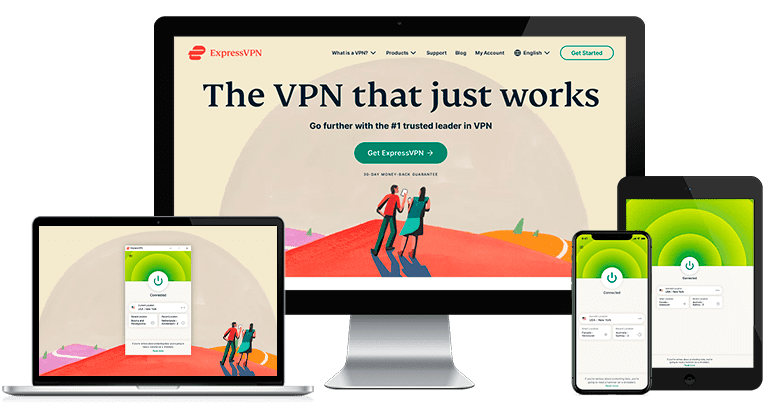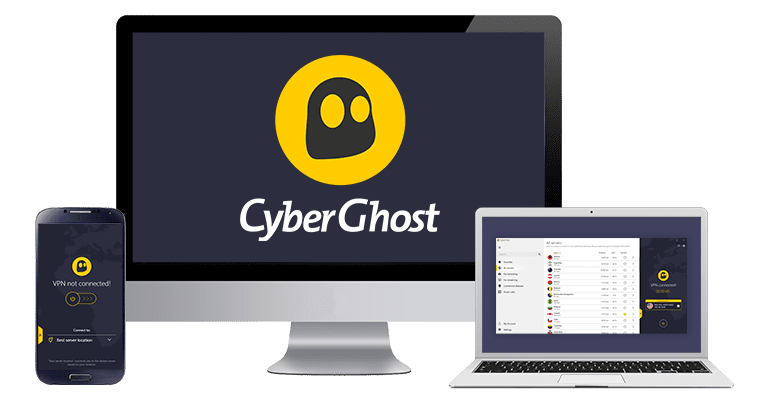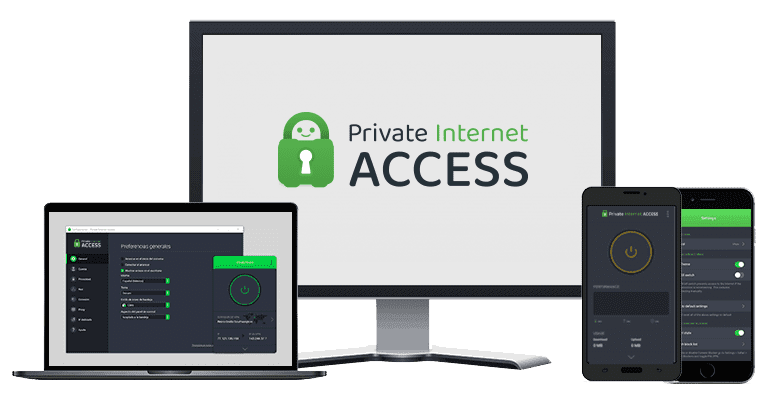Does a VPN Hide Browsing History From Routers And Others?
Yes, VPNs hide your browsing history from WiFi routers by encrypting your internet traffic. However, not all VPNs prioritize your privacy. Some VPNs log your information when you do online banking and shopping so they may sell or share the data with others.
But, after extensive research and testing, I’ve found the most reliable VPNs for hiding your browsing history from routers. I’ve also identified other ways to protect your data, whether or not you use a VPN, and answered a few other questions related to your privacy.
My top recommendation among the VPNs I tested is ExpressVPN. It hides your browsing history reliably with strong encryption protocols, no-logs policy, and RAM-based servers. Its 30-day money-back guarantee also allows you to try ExpressVPN risk-free.
Editors’ Note: Intego, Private Internet Access, CyberGhost and Expressvpn are owned by Kape Technologies, our parent company.
Get ExpressVPN for secure browsing
3 Easy Steps to Hide Your Browsing History From Routers
- Download a VPN. I recommend ExpressVPN as it’s the best VPN for hiding your browsing history from routers.
- Connect to a server. Nearby servers provide better speeds than those that are far away.
- That’s it! Now, you can start browsing securely and privately.
How VPNs Hide Your Browsing History
Without a VPN, your internet traffic is exposed to your router, internet service provider (ISP), the websites you visit, and others watching your activities. A VPN encrypts your online searches and other data before they leave your device. The stronger the cipher, the harder it is to break, which is why I recommend VPNs that use AES 256-bit encryption.
Although this traffic passes through your router, neither the router nor your ISP can see its content because of the encryption. Hackers trying to intercept your connection also can’t see anything. Before sending it to the destination website, the VPN server decrypts the data. As far as the website is concerned, your search was made from the location of the VPN server.
Do VPNs Hide Your Browsing History From A Router?
Yes, VPNs encrypt and hide your browsing history so routers can’t decipher the traffic that passes through them. Even network administrators and others with network-level access can’t see your online activities.
VPNs can also bypass your router’s firewall, which prevents access to certain websites, especially in schools and workplaces. Since VPNs use specific transport protocols and ports, network administrators can also block them, which prevents some VPNs from working.
Fortunately, there are VPNs with obfuscation or stealth mode (they mean the same thing). Obfuscation hides the fact that you’re using a VPN. It makes the traffic appear like regular internet traffic to overcome blocks imposed by network administrators.
Do VPNs Hide Browsing History From ISPs?
Yes, a VPN can technically hide your browsing history from ISPs, but I don’t recommend using a VPN for this purpose, as it may go against your ISP’s terms of service. However, your ISP can tell that you’re using a VPN and for how long. It just won’t be able to see essential details like:
- The websites you visit
- The content of your emails
- The apps you use
- Your online interactions
- Browsing session durations
- The files you download or upload
Do VPNs Hide Your Browsing History From Your Employer?
Yes, VPNs can hide your browsing history from your employer. Supervisors can use their network access to monitor employees’ online activities. But keep in mind that if VPNs are prohibited in your workplace, you could be in trouble if caught using one.
VPNs can also conceal your browsing history from a landlord, IT technicians at school, and even public WiFi administrators. Additionally, a VPN allows you to bypass router firewalls, enabling you to access restricted sites using school, college, or workplace networks. I don’t condone this, however, so don’t use a VPN to break any rules or laws.
Bear in mind that your supervisor or manager can also monitor your screen directly. They can use remote access software, keylogging technology, or a pre-installed screen monitoring program. You can take precautions by deleting your browser history, cache, and cookies at the end of each session, even if you use a VPN.
Do VPNs Hide Your Browsing History From Google?
A VPN can’t hide your browsing history from Google as the search engine needs to see your queries to provide results. But when you’re connected to a VPN, Google can’t see your real IP address to tie your searches and history to it.
Unfortunately, Google has many other methods besides IP addresses to identify you. If you’re signed in to your Google account when using Google, it can associate your searches and previous search history with your account. So if you want your browsing history to be anonymous, log out of your Google account.
Google also uses sophisticated algorithms to identify you through device type, screen resolution, GPS location, and behavioral patterns. If privacy is a major concern for you, use privacy-focused search engines like DuckDuckGo or Ecosia, and a privacy-focused browser like Tor. But even with these, 100% online anonymity is not guaranteed.
How To Hide Your Browsing History
Considering that VPNs alone can’t completely hide your browsing history from routers and other third parties, here are a few other precautions to take:
- Browse privately — use private browsing mode to prevent your browser from remembering sessions. This is especially useful for hiding your browsing history from anyone who has access to your device.
- Delete your search history — delete your search and browsing history manually from your browser to prevent tracking by those with physical access to your device.
- Change search engines — opt for privacy-focused search engines like DuckDuckGo, Ecosia, or Tor, which collect less data compared to mainstream search engines.
- Remove trackers — eliminate local logs such as cookies and cache on your browser regularly to make it difficult for websites and search engines to identify and track your online activities.
- Change DNS settings — change your DNS server from the default ISP server to a public DNS server like Google Public DNS. It minimizes the chances of websites using DNS requests to track the sites you visit.
- Use HTTPS Everywhere — using browser extensions like HTTPS Everywhere switches all HTTP websites you visit to HTTPS automatically to enhance your security.
- Use ad blockers — prevent adware from logging your browser and search history. Some VPN providers may offer effective ad blockers as part of their services.
- Clear browser download data — clear download data, especially after downloading secure and sensitive files to protect your data from hackers and other users with physical access to your computer.
What Does a Good VPN Hide?
Internet Activities
These activities include everything you do with the internet and every data you have stored online. When planning a trip, airline booking sites may use your IP address to identify you and increase prices when you search for the same flight again. Hackers can steal your online medical data and insurance credentials to commit insurance fraud.
You can avoid all these by hiding what you’re doing online with a VPN. However, I don’t condone using a VPN to find cheaper flight tickets or hide from your ISP as it’s against most service providers’ terms of service.
Browsing History
Your online activities leave a digital trail that any prying eyes can track and record. This can be shared with others, including advertising networks, governments, law enforcement agencies, and data brokers. By encrypting your internet traffic, a VPN ensures that your browsing history remains private and hidden from potential surveillance.
IP Address and Location
An IP address is a digital identifier assigned to every device connecting to the internet. It reveals details about your physical location, ISP, and browsing history. Without a VPN, your IP address is exposed and can be used to identify you on the internet.
A VPN however, substitutes your real IP address with its own to conceal your true location from hackers and malicious websites. Hiding your IP address also enables you to access geo-restricted sites and avoid DDoS attacks from disgruntled online players.
Personally Identifiable Information
When you connect to unsecured WiFi in an airport or cafe, hackers may intercept sensitive data. This includes your contact details, credit card details, login credentials, and other personally identifiable information (PII). A VPN encrypts this data so hackers can’t decipher it even if they manage to intercept the traffic containing your PII.
Geolocation
Some VPNs offer a feature known as GPS spoofing, which ensures your actual location remains hidden from sites that use your device’s GPS system. When an app or website tries to retrieve your GPS location, the VPN sends them a different set of coordinates to hide where you are.
The Fact That You’re Using a VPN
Network administrators and websites can detect VPN usage to block access to certain content, sites, or apps. This is done by identifying the protocol and ports being used. Others, including ISPs and some governments analyze the contents of data packets passing through a network using Deep Packet Inspection (DPI) to block VPNs.
However, there are VPNs that use obfuscation technology to hide the fact that you’re using them. A popular method routes VPN traffic through the same port used for HTTPS traffic. By making a VPN connection appear like standard HTTPS traffic, it becomes more challenging for DPI tools to identify and block.
The Best VPNs to Hide Your Browsing History in 2024
1. ExpressVPN — #1 VPN With Top Privacy Protection to Hide Your Browsing History
Key Features:
- Over 3,000 fast servers in 105 countries
- Built-in obfuscated servers in all locations to conceal your browsing history
- Connect up to 8 devices simultaneously
- Customer support via 24/7 live chat, email, and video tutorials
- 30-day money-back guarantee on all plans
ExpressVPN is the best VPN for hiding my browsing history from routers due to its obfuscated servers, fast speeds, and large server network. Its no-logs policy is backed by RAM-based servers that purge data with every reboot. ExpressVPN also runs its own, private DNS to keep your browsing private from WiFi operators, hackers, and other third parties.
Although ExpressVPN offers multiple protocols, I prefer its proprietary Lightway due to its faster connection speeds. It has a smaller codebase that makes it easy to perform security audits, consumes fewer resources, and offers stable connections. The best part is, Lightway does all these without compromising security.
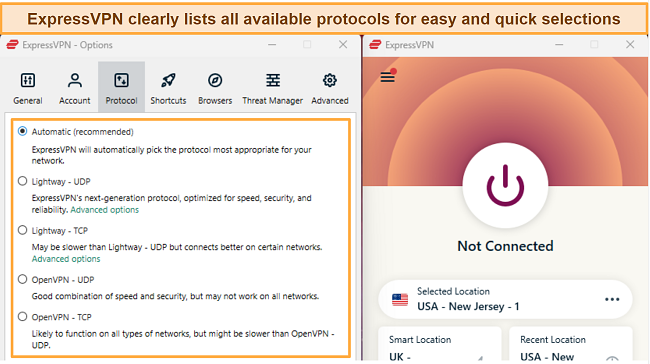
The only issue with ExpressVPN is that it is slightly more expensive than all the other VPNs I tested. However, it usually offers discounts, which can help you save on your subscription. Among short-term plans, ExpressVPN is one of the best monthly VPNs.
You can get ExpressVPN’s 1-year + 3 months plan for $6.67/month. ExpressVPN is backed by a 30-day money-back guarantee, so you can buy it confidently. I contacted customer support via live chat for a refund, and I got my money back in 5 days.
ExpressVPN works with: Windows, macOS, Linux, Chromebook, Android, iOS, Chrome, Firefox, Edge, PlayStation, Xbox, Nintendo Switch, Amazon Fire TV, Amazon Fire TV Stick, Nvidia Shield, Xiaomi Mi Box, Chromecast, Roku, Android TVs, smart TVs, routers, and more.
Editors' Note: ExpressVPN and this site are in the same ownership group.
2024 Update! ExpressVPN has dropped prices for a limited time to a crazy $6.67 per month for the 1-year plan + 3 months free (you can save up to 49%)! This is a limited offer so be sure to grab it now before it's gone. See more information on this offer here.
2. CyberGhost — Automatic WiFi Protection Secures Your Browsing History
Key Features:
- Connect to 11,800+ servers across 100 countries
- Multiple security protocols, including IKEv2 and WireGuard to secure your connection
- Allows up to 7 simultaneous device connection
- Online support via 24/7 live chat, email, and step-by-step guides
- Generous 45-day money-back guarantee
CyberGhost has WiFi protection to hide your data from network administrators and routers when using public hotspots. You can set this up in the Smart Rules section of the app. Once set up, it will take specific action, such as ignoring the WiFi network or disabling the VPN connection every time your device detects an unfamiliar WiFi network.
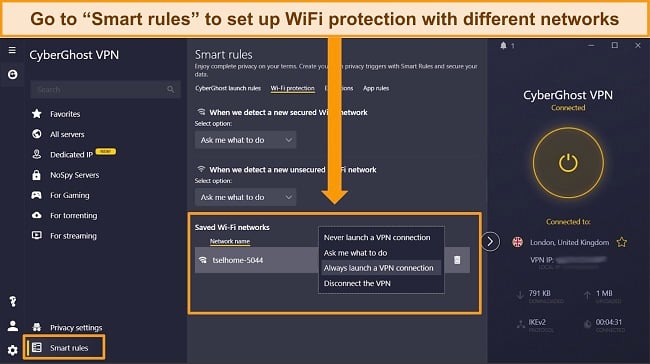
Unfortunately, I experienced slower browsing speeds on CyberGhost’s distant servers compared to ExpressVPN. But regardless of which server I connected to, the speeds didn’t go below 85 Mbps, and this was fast enough for downloading large files.
You can save money on the 2-year + 2 months plan, which is $2.19/month. All CyberGhost’s plans are backed by a 45-day money-back guarantee. I tested this by contacting its customer support via live chat, and within 4 days, my refund was approved.
CyberGhost works with: Windows, macOS, Linux, Android, iOS, Raspberry Pi, Chrome, Firefox, PlayStation, Xbox, Nintendo Switch, Amazon Fire TV, Amazon Fire TV Stick, Roku, smart TVs, routers, and more.
3. Private Internet Access — Largest Server Network, Offering More Secure Connection Options for Anonymous Browsing
Key Features:
- 35,000+ servers across 91 countries
- Largest network size with multiple servers with strong encryption for safe browsing
- Allows unlimited simultaneous device connection
- 24/7 live chat support, email support, and step-by-step guides
- 30-day money-back guarantee
PIA has more than 35,000 servers across 91 countries, so you have even more options for hiding your real IP address and browsing history. Its MACE feature blocked ads, trackers, and malware at the DNS level, keeping my privacy intact.
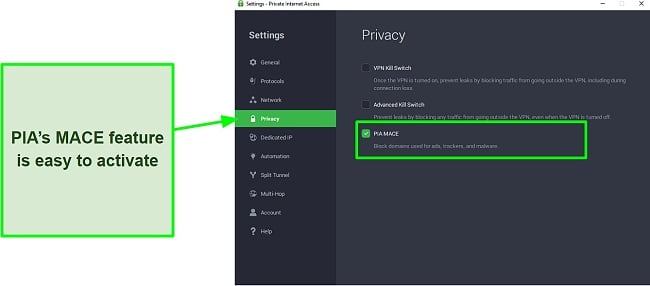
The only concern I have about PIA is that it is based in the US, which is part of the 5-Eyes Alliance. However, its strict no-logs policy means it keeps no data to share with authorities, making it one of the best VPNs in 2024.
I tried the 2-year + 2 months plan for $2.19/month. It is backed by a 30-day money-back guarantee, so you can test it risk-free. I also tested the refund policy and got my money back in 7 days.
PIA works with: Windows, macOS, Linux, Android, iOS, Chrome, Firefox, Opera, PlayStation 4, Xbox One, Amazon Fire TV devices, Chromecast, Apple TV, Roku, smart TVs, routers, and more.
Editors’ Note: Intego, Private Internet Access, CyberGhost and Expressvpn are owned by Kape Technologies, our parent company.
How To Choose a VPN to Hide Browsing History
Here are the criteria I considered when choosing the VPNs above:
- Global servers — a large global network provides more IP addresses to hide your IP and location without facing server congestion.
- Obfuscation — I tested the top VPNs and prioritized those with obfuscation features that can hide VPN traffic effectively.
- Security features — features like AES 256-bit encryption, a kill switch, and DNS leak protection are necessary for VPNs to prevent data exposure.
- Privacy features — I only selected VPNs with RAM-based servers, as they don’t store user data on disk.
- Money-back guarantee — by selecting VPNs with at least a 30-day money-back guarantee, you can purchase the VPN with confidence.
What VPNs Can’t Hide or Do
- Remove cookies from your computer. Websites with stored cookies can still identify you unless you clear your browser’s cookies.
- Make you completely anonymous. Consider using alternative browsers like Tor as well as privacy-friendly search engines like Ecosia and DuckDuckGo alongside a VPN, but remember that 100% privacy still can’t be guaranteed.
- Keep your computer virus-free. Dedicated antivirus software is necessary to safeguard your device against malware.
- Protect you from phishing attacks. Be vigilant and check all links before clicking, and avoid downloading files from unknown sources.
- Hide your GPS location. While some VPNs offer GPS spoofing features, most don’t and can’t shield you from websites and apps that track GPS data.
- Hide your data usage. VPN encryption doesn’t hide the amount of data or bandwidth you consume, so ISPs and mobile carriers can still see this.
- Hide browsing history from itself. While VPNs hide you from everyone else, they can actually see everything you, so select a reputable VPN with an independently verified no-logs policy.
FAQs About VPNs and Hiding Your Browsing History
Does private browsing hide your browsing history?
No, private browsing doesn’t hide your browsing history from your ISP, router, and websites on its own. Private browsing (including Incognito, InPrivate, Private Window, and Private Mode) only prevents the storage of cookies, trackers, search, and browsing history on your device. It’s better to use private browsing together with a VPN.
Can your browsing activity be traced back to you despite using a VPN?
Yes, your browsing activity can be traced if the VPN leaks your data. This is why I recommend using a tried and tested VPN for hiding browsing history. Alternative tracking methods like cookies, spyware, and even your social media posts can reveal your online activities and identity.
How do you hide that you’re using a VPN?
Use a VPN with obfuscated servers like ExpressVPN. It makes your VPN traffic seem like regular traffic so that firewalls don’t block your connection. Most VPNs don’t offer this feature while others don’t work in some places. ExpressVPN is one of the few VPNs that work even in restrictive regions like China.
Do websites know when you’re using a VPN?
Yes, some websites know when you’re using a VPN. VPN IP addresses can be identified, and there are databases dedicated to this. Fortunately, a VPN like ExpressVPN refreshes its IP addresses frequently to remove those that are blacklisted so it’s hard to detect.
Does your WiFi router record your history?
Yes, but with a VPN, your WiFi router cannot see the sites you visit. Otherwise, your router keeps a log of your connected devices, the websites you visit, the time you spend on each site, and even web traffic.
How long does a router store history?
The duration a router stores browsing history varies, but using a good VPN can hide your browsing history from the router. Some routers may retain browsing history for just a few hours while others could store it for several months or even longer.
Can a free VPN hide your browsing history?
Yes, but not all free VPNs are reliable. Many free VPNs often compromise user privacy by logging and selling your data to third parties. I only recommend you try these free VPNs to make sure your connection is secure and your browsing history stays private.
Get a VPN That Hides Your Browsing History Effectively From Router
Using privacy-focused browsers and clearing tracking cookies can protect your online privacy. But you need a VPN to effectively conceal your browsing history from all third parties, including WiFi routers. VPNs encrypt your internet traffic, ensuring it’s unreadable to any prying eyes.
However, it’s crucial to choose a reliable VPN like ExpressVPN. It has advanced encryption protocols, obfuscation, leak protection, and a strict no-log policy to ensure effective hiding of your browsing history. ExpressVPN is also backed by a 30-day money-back guarantee so you can get it risk-free.

